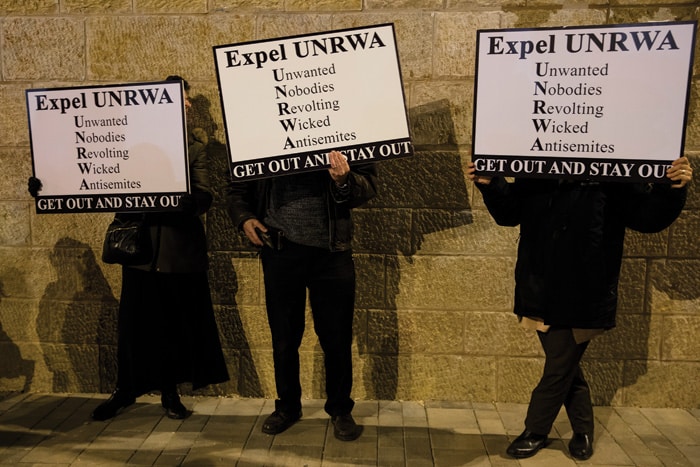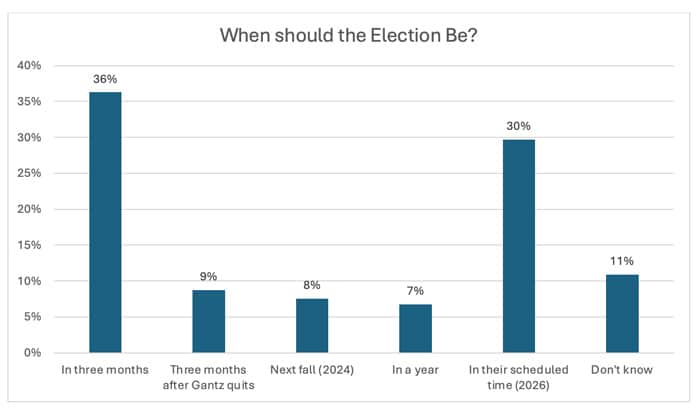 Protesters hold signs in front of the UNRWA office in Jerusalem
Amir Levy/Getty Images
Protesters hold signs in front of the UNRWA office in Jerusalem
Amir Levy/Getty Images Like all things, books have their peak moment. For many of them, it is when they are published. For others, like “The War of Return” by Einat Wilf and Adi Schwartz, it is now, four years after publication.
The book hasn’t changed since it was written, neither did reality. But we did. We changed on Oct. 7th, when the tolerable UNRWA became intolerable. Ask Wilf and Schwartz, and they will tell you it was intolerable for a long time; they will tell you it is Israel’s fault – to some degree – that this organization, an agency charged with finding a solution for Palestinian refugees still operates, when a fourth or a fifth generation of supposed refugees is growing up. UNRWA is not a problem solver, it is a problem exacerbator. This happens to many organizations: The cause must be kept alive lest the organization becomes obsolete. For UNRWA, keeping the cause alive means a simple thing: never solving the Palestinian refugee problem.
There are two problems with UNRWA, one of which became evident in the last two to three weeks, as more reports about UNRWA employees, involvement in the October massacre and more evidence of UNRWA employees’ assistance to Hamas came out. There’s evidence in almost all UNRWA facilities: a tunnel beneath an office, a stash of ammunition or cash, a person who guards hostages, all courtesy of this U.N.-sponsored human rights organization.
This current problem is the result of the original sin, the original problem. As UNRWA became entrenched, its mission was no longer to settle the refugees and their sons, grandsons, great-grandsons, great-great-grandsons, but rather to keep their dream of “going home” alive. That is, to keep a sinister and disruptive vision for the Palestinians, one in which Israel somehow ceases to exist as the millions of supposed exiled Palestinians go back to places that were resettled decades ago by other people.
Such a vision should not come as great surprise, because UNRWA is an international organization by name and funding only. It gets its allocations from a naïve, or baleful, world, it draws its legitimacy from being an agent of the international community. But in fact, it is a Palestinian organization funded by outsiders. Other than a few foreigners in managerial positions, almost all UNRWA employees are Palestinians. In Gaza, they are Gazans, and, in most cases, supporters of Hamas. They get their salaries from you — Americans, or Canadians, or Norwegians — and they work for Yahya Sinwar, a coldblooded killer and a master of violence. They work for him in two ways: as perpetrators of terrorism, or perpetrators of hate.
Note this: When UNRWA takes care of schools and medicine in Gaza, all expenses are paid by you. It’s not because there’s no money in Gaza to fund these activities; it is because Hamas takes that money and uses it for other purposes, such as arming itself, digging tunnels, firing rockets. UNRWA is an agency whose work gets Hamas off the hook of having to provide for the population of Gaza. Hamas is engaged in violence, while UNRWA keeps the people of Gaza fed, clothed and schooled. That’s a convenient arrangement for all parties involved. Hamas has free hands to do what it wants to do, UNRWA has a mission that keeps it viable. All this is well known and documented. You can read all about it in the above-mentioned book. There’s no news – except for the fact that we were suddenly made to realize that UNRWA is not a nuisance, it is a threat that must be dealt with. It is a threat that should be eliminated along with Hamas rule. There are less corrupt and less political aid agencies that can replace UNRWA, such as USAID, the World Food Program, and other groups that already have functioning operations in certain Palestinian areas.
The most eager supporters of this decision – to eliminate UNRWA – ought to be those who want to someday see a cure for the Israeli-Palestinian conflict. The cure will not come when the world funds an organization whose main activity is to keep a wound open, to preach the gospel of victimhood, to educate the next generation of people with no dream other than the destruction of other people’s homes and country. That this organization is also swarmed with terrorist supportive employees is not a bug, but a feature. You can’t run an army by staffing it with pacificists, you can’t run a school by staffing it with illiterates, you can’t run an orchestra by staffing it with only deaf persons – and you can’t run an UNRWA believing that its workers will be a peace-loving, solution-seeking, peace-promoting bunch.
So, as they say, don’t let a crisis go to waste. Winning the war and keeping UNRWA would be a wasteful thing to do.
Something I wrote in Hebrew
Time for an election? There are signs that the public is losing patience.
The moment Gantz retires, with the Kaplan St. protesters already in the streets, will be the decisive moment. This is the moment that will connect those who still cling to the government because they feel there’s no other choice, and those who never wanted it and have long since given up on it. Let’s call them by names: supporters of the Gantz party and supporters of the Lapid party. The former do not yet take to the streets, and do not yet want elections. They are waiting for a sign. But one should not mistake them: They are really waiting for him, and assume that he will come. They want the government to go at the right moment in their eyes. When will he come? Some say “In the fall,” meaning, probably, October, or November 2024. Some say, right after Gantz quits.
A week’s numbers
Note that in this new JPPI poll, a majority supports an election by the coming fall.

A reader’s response:
Andy Cohen asks: “Do Israelis still consider President Biden supportive?” My answer: They do, but suspicion that he might not be as supportive as they thought begins to creep in.
Shmuel Rosner is senior political editor. For more analysis of Israeli and international politics, visit Rosner’s Domain at jewishjournal.com/rosnersdomain.























 More news and opinions than at a Shabbat dinner, right in your inbox.
More news and opinions than at a Shabbat dinner, right in your inbox.